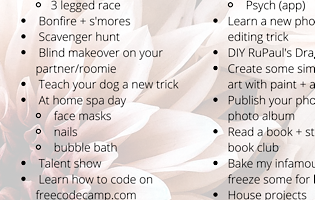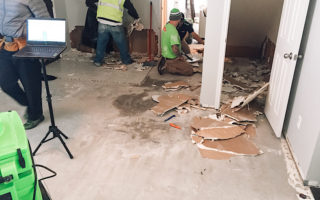
As many of you know, my husband Kevin and I recently became first-time homeowners! YAY! I shared just about every detail of the house hunting process with y’all on my Instagram stories (they’re saved to the “House Hunters” highlight if you want to check it out) and y’all LOVED it! I shared the process because so many of my favorite bloggers wouldn’t – and that drove me nuts! As a follower/consumer, I wanted to know the good, the bad, and the ugly. I didn’t want to see a post appear one day with “We bought a house!” and see that it’s already perfectly designed and decorated. I craved insight into how the process actually works, so I’ve decided to deliver it myself.
I’d like to start by reminding y’all that I am not an expert here. I’ve purchased one home in my life, and these were my personal learnings/experiences during the process. So while keeping that in mind, let’s jump in, shall we?
WHY
You first need to start with your “why?” Why do you want a house? If it’s because social media makes you feel like you need one, or you’re feeling pressure from your family, you may need to do some more soul searching. Our “why” was that we both wanted to invest in something, and I also had told myself that I wouldn’t feel comfortable having a child until we owned a home. I moved from California to Texas, away from all my friends and family, and have decided to stay put for now because the cost of living is far more reasonable. So, to make my sacrifices worth it, I wanted a home of my own (something I could never afford in CA). Kevin and I have been married for just over a year, and we’re both pretty close to being ready to start a family. Buying a house was, for us, the obvious next step.
HOW
Once you’ve decided that you are ready to start the house hunting process, you may find yourself wondering how to actually start? What comes first? How much money do I need? The anxious questioning is endless. By following these steps in order, you’ll see that the home buying process is actually pretty easy! If you do any of these steps out of order, you may find that it’s a bigger headache than it needs to be.

The Home Buying Process (how to start, what to do, and when):
1. Preapproval
How does someone begin to buy a house? The very first step is to get preapproved for a home loan. This means you will need to meet with a Mortgage Loan Officer. All (most?) banks have home loan offerings, and they can set you up with a professional.
Note: it is normal and 100% acceptable to shop around for offers to get the lowest rate. We received two pre-approval offers (one from a local branch, and one from Rocket Mortgage). We went with the local branch because we liked having face-to-face interactions and personal guidance from our loan officer, but Rocket Mortgage is a great place to start to gauge how much you may be offered (although you don’t have to choose Rocket Mortgage – there’s tons of online loan applications you can use to see where you’re at). If your Rocket Mortgage offer is way lower than you want, then you’ll probably need to take a break and work on your weaker areas (credit score, cash down amount, etc.) before starting the process again. It is important to note that every time you apply for a pre-approval, they are pulling your credit score, which costs you a few points – so don’t overdo it.
*If you already have a realtor, they probably have great loan officer recommendations. That’s how we found ours.
**A lot of documentation regarding your financial health is needed for pre-approvals and the actual loans. Just take it one step at a time. A good loan officer will give you a list of what’s needed and allow you time to gather it all. We turned everything in 3 days after receiving our list, and apparently that was considered incredibly fast 🙂
***Many times you’ll be pre-approved for an amount far higher than you’ll really want to spend. Make sure to ask your loan officer to break down your monthly fees and cash down + closing costs for you, so you can more easily see what you’ll be spending month-to-month. You do NOT have to use the full amount of your pre-approved loan.
2. Find a Realtor + Begin House Hunting
Now that you’ve been preapproved, you can begin the house hunting process! There are TONS of realtors in every town, so I suggest asking a friend or family member for a recommendation so you know you’re working with a great one.
Your realtor will ask for your wish list and desired location. The more specific you can be, the less time you’ll waste looking at houses that aren’t right for you.
*Don’t be afraid to make an offer on one of the first houses you see! We saw one the very first day that was SO good, but had nothing to compare it to. We waited to see more houses, and by the time we were considering it, it was off the market. You need to be prepared to move FAST, which means you need to have all of your cash ready to go.
**On the other hand, be patient. Our realtor was so sweet and reassuring by telling us that the right house will find us, and reminding us not to settle. There are tons of homes out there, so wait for the moment when you walk in and immediately feel like you’re home.

3. Make An Offer & Negotiations
Once you’ve made an offer (super easy – this is the meat of your realtor’s job), you may go back-and-forth with the seller a bit on negotiations. Something important for first-time home buyers to know is that if the seller negotiates back, as soon as you accept their offer, the house is yours! So if you REALLY want a house, I’d suggest doing your best to accept any negotiations as soon as possible. The more back-and-forth you do, the more chances the seller has to back out.
*Our realtor told us that the difference between a couple grand when buying a house is incredibly low. Like…the difference of $20 a year (or something like that). So don’t get caught up in a couple grand! In the grand scheme of things, it isn’t going to affect your monthly costs much.
**Something our realtor didn’t mention to us (and I desperately wish she had) was to ask for a professional deep cleaning of the house to be added in during negotiations. I’ve been so used to moving into apartments that are professionally cleaned before move-in day, that the thought never crossed my mind. When I began unpacking our kitchen upon moving in, I had to stop everything and spend the majority of the day cleaning after seeing how filthy the previous owners had left it, rather than unpacking and organizing. That hurt my spirit a lot. By all means – for yourself and peace of mind – ask for a professional cleaning.
4. Go Under Contract & Get Your Home Appraised & Inspected
Once negotiations have been accepted by both parties, you are officially under contract! Congratulations! This is the biggest “moment” during the house buying process, in my opinion. I thought closing day would be the bigger deal, but after your open option contract period, the house is as good as sold. So, take this time (and the report of your appraisal) to celebrate!
Our contract period was 7 days. The seller asked for 5, but our realtor was adamant about 7 days so that we had enough time and flexibility to get an inspector and an appraiser to review the property. Being under contract is the last time you are able to back out with no repercussions. This is the time to hire an inspector, get the property appraised, and would also be a good time to have a contracter swing by and give you a quote for any renovation projects you have in mind (because if it’s going to cost far more than you expected, you can easily back out of the deal before signing your life away).
If your appraisal comes in HIGHER than what you’re paying for the house -good for you! You got a great deal! If your appraisal comes in LOWER than your offer, then you’re in a sticky situation. You see, the bank will only loan you the $ for what the house is worth. Even if you were pre-approved for $400k, if your appraisal comes in at $350k, then that’s all you get. Which means if you really want the house, you’ll have to come up with the difference in CASH to offset it. Our realtor told us that years ago, it was typical for the seller and buyer to split that cost if it came down to it, but that is happening less and less these days, leaving the buyer to come up with the money. So, let’s just hope your appraisal comes in higher than what you’re paying (like ours did)!
5. Closing
The amount of days it’ll take to close on your home can vary. Ours was super quick (14 days) because our loan was coming from a smaller, local bank. I’m no expert, but I’d imagine that if you’re working with a larger company it may take more time to get the paperwork done. During this period you’ll be giving your loan officer(s) access to pretty much your entire financial history. Bank statements, letters to prove “gifts” (my parents gave us some $ to help with our down payment – they had to write and sign a letter to verify – ugh!), and much more. It feels pretty invasive and never-ending, but just know that these people do this every day. They are very professional and trustworthy.
Once all of the paperwork has been filed on their end, you’ll set a closing date, where you’ll go to an office and sign all of your papers. I thought there’d be more signing, but it wasn’t too bad! At the end of this meeting you get the keys to your new home! You’re allowed to access your home as soon as the funds have been transferred (which usually takes 24 hours or less).
Don’t forget to give a big hug and “thank you” to your realtor and loan officer – they’ve worked hard for you!

Important Notes
Something interesting I learned during the process that had me COMPLETELY shocked was this: you do not automatically get all of the money you are preapproved for. I was under the impression that if we found a fixer-upper, we could use the remaining funds to cover renovations. HA! Wrongo! The bank only gives you the amount to cover your house. Most people who do renovations are using cash, credit, or have taken out another loan to cover reno costs. Now, when I mentioned this on my IG stories, a few members of our community reached out and told me that they were able to use part of their mortgage to cover costs (or the bank they work for allows it). So as you can see, every situation is different. But I wanted to bring this to your attention because WHAT a (terrible) wake-up call it’d be to purchase a fixer-upper and then be stuck, unable to do any renovations. YIKES!
Another piece of info I found important is that you are able to write off renovation costs on your taxes (ask your realtor for specifics – we haven’t done this yet personally.) All I know is, keep every receipt of home reno projects as you go!
One of the perks of buying a home is that your payments don’t kick in for at least another month! I had been so concerned about having our rent and mortgage payment overlap, but there was no need for me to worry. We closed on December 5th and our first mortgage payment wasn’t due until February 1st. This gives you a decent cushion to purchase furniture, higher movers, or start on some renovations (or for us, buy Christmas presents lol).
This was the article I WISH I had been able to read before starting the home buying process. I’ve tried to lay out alllll the info here in an easy-to-follow format so that you feel comfortable and knowledgeable every step of the way. I hope it’s helpful for you! Let me know in the comments if you had a different experience or have any other awesome tips to share!
All is fair in love, war, and whatever your loan appraiser asks of you,

Shop the look:





